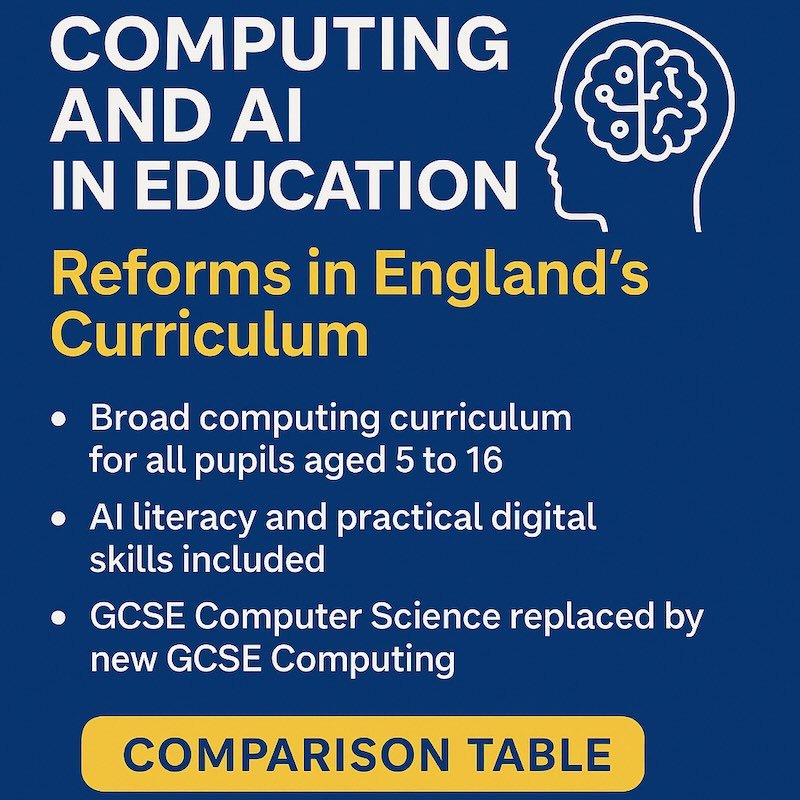A New Direction for England’s National Curriculum
The recent Curriculum and Assessment Review in England marks one of the most significant updates to national education policy in over a decade. Announced alongside the UK Department for Education’s (DfE) official response, the review outlines plans for a world-class curriculum and assessment system for all learners.
Led by Professor Becky Francis, the review calls for a shift from the traditional focus on transmitting “the best that has been thought and said” towards equipping students for a rapidly changing, technology-driven world. It places inclusion, relevance, and even a love of learning at the heart of the English curriculum — a phrase that signals a broader, more human-centred approach to education policy.

Inclusion, Equity, and Student Voice
England’s education system, long regarded as a global reference point, still faces challenges in equity. The review highlights ongoing gaps in attainment between disadvantaged and advantaged pupils, particularly in the key Progress 8 measure used for secondary schools.
To address this, the new framework aims to make the curriculum an entitlement for every child, not just those who already thrive within it. Schools will continue to teach essential knowledge — such as literature and mathematics — but will also need to foster student choice, curiosity, and agency. Balancing national coherence with personalisation is presented as key to sustaining engagement and preparing young people for autonomy in adulthood.
Continuous Review and Teacher Involvement
Unlike previous reforms, which occurred once a decade, the new approach introduces regular curriculum refreshes. The last comprehensive update in England took place in 2012, and the world — particularly in digital skills — has changed dramatically since.
Teachers will be drawn into the design and testing of future programmes of study, ensuring classroom realities inform policy. However, pupils themselves will not yet have a formal role in shaping content, leaving open the question of how student perspectives might eventually influence national design.
Assessment: Real-World Relevance Meets Academic Integrity
The DfE has confirmed that exams will remain central to England’s assessment model, reflecting a continued emphasis on reliability and fairness. Non-Exam Assessments (coursework) will remain limited, largely due to concerns about AI-assisted cheating.
However, assessment will increasingly aim to be authentic — mirroring the way subjects operate in the real world. This could include, for example, allowing controlled use of technology in computing or design subjects. The review also revisits pathways for older students, recognising the value of both academic (A Levels) and vocational (T Levels, BTECs) qualifications, and even hybrid models combining the two.
Redefining Computing Education
The biggest change comes in computing education. The DfE acknowledges that the English curriculum must evolve to reflect how digital technologies — including artificial intelligence — shape modern life and work.
Key developments include:
- Digital Literacy as Core: Skills such as document creation, spreadsheet modelling, and effective use of AI tools will become essential competencies for all students, not just those specialising in computing.
- Media and Information Literacy: Pupils will learn to recognise misinformation, disinformation, and AI-generated “slop”, developing critical awareness of the digital world.
- AI Literacy: Students will be taught how to use AI effectively and ethically, while understanding its limitations and biases.
This new framework positions computing as a foundational subject from ages 5 to 16 — making digital literacy a universal entitlement rather than an optional extra.
A New GCSE in Computing
Perhaps the most headline-grabbing proposal is the replacement of the current GCSE in Computer Science with a broader GCSE in Computing. This qualification will reflect the full breadth of the discipline — encompassing computer science, information technology, and digital literacy.
Proposed features include:
- A practical exam to assess real-world computing tasks in controlled conditions.
- A written paper covering algorithms, data, cybersecurity, ethics, and responsible AI use.
- Recognition of teamwork, project management, and problem-solving skills alongside coding.
This redesign aims to make computing accessible to all students, while ensuring that rigorous technical understanding remains at its core.
Preparing for the AI Economy
In a surprise announcement, the DfE will also explore a new Level 3 qualification in Data Science and AI — roughly equivalent to pre-university level — to prepare students for high-value careers in emerging technology sectors. This move aligns with developments in other countries such as South Korea and China, which have already embedded AI education within national curricula.
Implementation Timeline
- Spring 2027 – Draft curriculum released for consultation.
- September 2028 – New English National Curriculum takes effect.
- September 2029 – New GCSE in Computing introduced.
- Summer 2031 – First students sit the reformed examinations.
Teacher training and enrichment through the National Centre for Computing Education (NCCE) will continue to be supported, ensuring that educators are ready to deliver these changes effectively.
Evolution, Not Revolution
While the review modernises England’s education system, it maintains continuity with its existing structure. GCSEs, A Levels, and key stages remain intact, ensuring stability while embracing innovation. This is an evolutionary reform designed to keep England competitive and forward-looking, while reaffirming the principle of education for all.
Why It Matters Globally
For educators and policymakers beyond England, this review offers a clear message: AI and digital literacy are no longer optional skills. They are essential components of modern citizenship. By integrating them into a compulsory national curriculum, England is signalling to the world that future-readiness begins in the classroom.
Compared to other curricula
We’ve had a few articles over the past few months and it is interesting to compare to others.
| Country / Region | Curriculum Direction | Key Features | Assessment & Implementation | Global Relevance |
|---|---|---|---|---|
| England (English National Curriculum) | Broad Computing for All from ages 5–16, replacing GCSE Computer Science with a wider GCSE in Computing. | Includes AI literacy, media literacy, ethics, data handling, and practical digital skills such as spreadsheets and presentations. | Retains written exams with added practical assessments under controlled conditions. Full rollout by 2028–2031. | First national curriculum to make AI and digital literacy a core entitlement for all pupils. |
| Singapore | Updated national Computing syllabus (2024) and new GenAI literacy framework. | Problem-solving, data, cybersecurity, ethics, and responsible AI use. | National exams remain central; teacher training aligned through SkillsFuture and MOE. | Model for combining high academic rigour with applied AI learning. |
| South Korea | Integrating AI concepts across K–12. | Focus on AI fundamentals, ethics, and creative applications. | Gradual rollout within existing ICT framework. | Among the earliest adopters of AI as a national subject strand. |
| China | AI made compulsory in several provinces; integrated into computer and science classes. | Project-based AI learning from primary onwards; major teacher-training investment. | Regional flexibility within central policy. | Rapid national scaling shows how AI can become mainstream in basic education. |
| European Union | DigComp 3.0 digital competence framework and EU-wide AI/media literacy push. | Emphasis on critical use of data, digital citizenship, and safety. | Adopted at member-state level; often tied to lifelong-learning goals. | Provides a shared benchmark for 27 systems—strong policy model. |
| United States | AI4K12 and CSTA revising national CS standards (due 2026). | Concepts, ethics, and age-appropriate AI practice; state-by-state adoption. | Mixed assessment systems; flexible for local contexts. | Decentralised innovation and extensive open-source AI curriculum materials. |
| UNESCO & OECD (Global) | AI Competency Framework for Teachers; PISA 2029 “Media & AI Literacy (MAIL)” assessment. | Teacher ethics, AI awareness, and student benchmarking of media/AI literacy. | Used internationally to align teacher training and system benchmarks. | Global reference point guiding AI and digital literacy integration. |
Read the final document here>>
